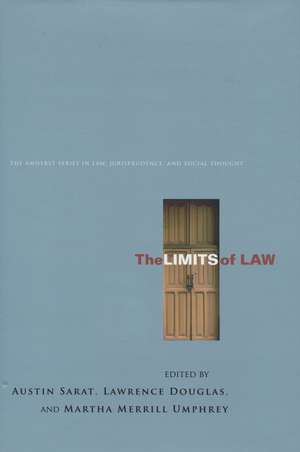The Limits of Law: Amherst Series in Law, Jurisprudence
Editat de Austin Sarat, Lawrence Douglas, Martha Umphreyen Limba Engleză Hardback – 11 iul 2005
This collection brings together well-established scholars to examine the limits of law, a topic that has been of broad interest since the events of 9/11 and the responses of U.S. law and policy to those events. The limiting conditions explored in this volume include marking law’s relationship to acts of terror, states of emergency, gestures of surrender, payments of reparations, offers of amnesty, and invocations of retroactivity. These essays explore how law is challenged, frayed, and constituted out of contact with conditions that lie at the farthest reaches of its empirical and normative force.
Preț: 478.46 lei
Preț vechi: 590.70 lei
-19% Nou
Puncte Express: 718
Preț estimativ în valută:
91.55€ • 95.85$ • 75.75£
91.55€ • 95.85$ • 75.75£
Carte tipărită la comandă
Livrare economică 05-19 aprilie
Preluare comenzi: 021 569.72.76
Specificații
ISBN-13: 9780804752350
ISBN-10: 0804752354
Pagini: 336
Dimensiuni: 152 x 229 x 25 mm
Greutate: 0.58 kg
Ediția:1
Editura: Stanford University Press
Colecția Stanford University Press
Seria Amherst Series in Law, Jurisprudence
ISBN-10: 0804752354
Pagini: 336
Dimensiuni: 152 x 229 x 25 mm
Greutate: 0.58 kg
Ediția:1
Editura: Stanford University Press
Colecția Stanford University Press
Seria Amherst Series in Law, Jurisprudence
Recenzii
"T]he essays collected in The Limits of Law, and the editors' well-crafted introductory essay, present 'law' in all of its richness and complexity."--Law and Politics Book Review
"These essays collectively give weight to the editors' claim, put forward in the introduction, that the study of law's limits has always, perhaps paradoxically, been central to the study of law's core, as well as to their deeper jurisprudential argument that law's normative, descriptive, and constitutive limits define law and its relation to power. An important collection for everyone interested in contemporary debates in jurisprudence, socio-cultural studies, and political theory, regarding law's reach, coherence, and desirability." —Robin West, Georgetown University Law Center
"The idea of the 'limits of law' is taken from the margins to the center of legal theory in this provocative collection. In the hands of these writers, even the submission to law is reimagined as a choice to invoke law's limits, and therefore an act not itself bound by law. Ultimately, limits are not the ends of law, or a place where law runs out, but where law is generated and constituted. At a time when many argue that post-9/11 exigencies require governments to act outside lawís limits, this collection is an elegant and essential rejoinder." —Mary L. Dudziak, University of Southern California Law School
Notă biografică
Austin Sarat is William Nelson Cromwell Professor of Jurisprudence and Political Science at Amherst College. Lawrence Douglas is Professor of Law, Jurisprudence & Social Thought, Amherst College. Martha Merrill Umphrey is Associate Professor of Law, Jurisprudence & Social Thought, Amherst College. Together, they are also the editors of Law on the Screen (Stanford University Press, 2005).
Textul de pe ultima copertă
“T]he essays collected in The Limits of Law, and the editors’ well-crafted introductory essay, present ‘law’ in all of its richness and complexity.”--Law and Politics Book Review
“These essays collectively give weight to the editors’ claim, put forward in the introduction, that the study of law’s limits has always, perhaps paradoxically, been central to the study of law’s core, as well as to their deeper jurisprudential argument that law’s normative, descriptive, and constitutive limits define law and its relation to power. An important collection for everyone interested in contemporary debates in jurisprudence, socio-cultural studies, and political theory, regarding law’s reach, coherence, and desirability.” —Robin West, Georgetown University Law Center
“These essays collectively give weight to the editors’ claim, put forward in the introduction, that the study of law’s limits has always, perhaps paradoxically, been central to the study of law’s core, as well as to their deeper jurisprudential argument that law’s normative, descriptive, and constitutive limits define law and its relation to power. An important collection for everyone interested in contemporary debates in jurisprudence, socio-cultural studies, and political theory, regarding law’s reach, coherence, and desirability.” —Robin West, Georgetown University Law Center
Descriere
This collection examines limits of law, a topic that has been of broad interest since the events of 9/11 and the responses of U.S. law and policy to those events. The limiting conditions explored in this volume include marking law's relationship to acts of terror, states of emergency, gestures of surrender, payments of reparations, offers of amnesty, and invocations of retroactivity.































